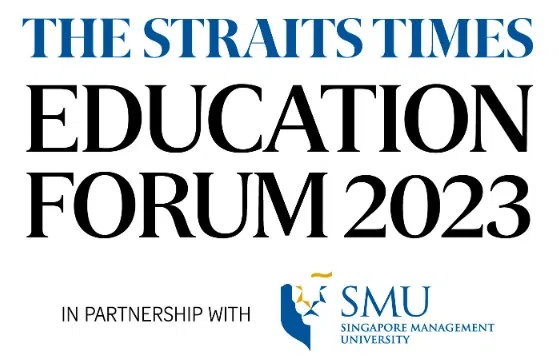Singapore education should move beyond focus on grades to a meritocracy of skills: Chan Chun Sing
Sign up now: Get ST's newsletters delivered to your inbox
At The Straits Times Education Forum 2023 on Mar 11 (Sat), panellists discussed the importance of sustainability skill sets, and the impact that artificial intelligence will have on jobs.
SINGAPORE - The Republic is known around the world for topping Programme for International Student Assessment (Pisa) rankings.
But Education Minister Chan Chun Sing on Saturday challenged Singaporeans to go beyond excellent Pisa scores and grade performance towards a meritocracy of skills, where regardless of where they start in life, everyone is given the chance to fulfil their potential.
“How can we be an exemplar to the world, a nation that celebrates diverse pathways of success and combines meritocracy with compassion, inclusion, and responsibility?” he said.
Mr Chan was addressing some 300 students at The Straits Times Education Forum held in partnership with the Singapore Management University (SMU) on the role higher education plays in building a sustainable and resilient future.
Another 30 students attended the event virtually.
In his keynote speech, Mr Chan said institutes of higher learning (IHLs) play a key role in building a meritocracy of skills through aptitude-based admissions and by providing different entry points and pathways for lifelong learning.
Beyond providing mass access to education, IHLs also need to tailor curricula to meet individuals’ different needs and strengths, he added.
“IHLs are already moving in this direction by offering options to customise degree programmes, and expanding the range of modular courses for adult learners to customise their learning based on their needs,” he said.
SMU’s new College of Integrative Studies,
Meanwhile, the Singapore Institute of Technology and Singapore University of Social Sciences have opened up more upgrading pathways for polytechnic graduates and adult learners.
IHLs also need diverse talents to cultivate diverse ideas, said Mr Chan. “They must go further to source for talent beyond traditional academic profiles – including professionals in other fields who are well-versed in stakeholder management, and can be connectors with industries both local and international.”
He also urged Singaporeans to think beyond themselves and to define success by contribution to society and the well-being of others, rather than individual achievement.
“Every Singaporean is a steward of the world he or she inherits, and must pay it forward to provide more opportunities, access, and networks to those who may be less privileged than us,” he said.
In the area of sustainability, the IHLs are Singapore’s living labs, said Mr Chan. The institutions must be “thought leaders” in imagining future cities and societies, he said. Apart from thinking about the use of energy, this could include other areas like designing cities and systems of transport, healthcare and waste management, he added.
To stay competitive, Singapore must be able to manage diversity and bridge divides, he said.
“IHLs must continue to connect across different disciplines, political blocs and diverse cultures,” he added.
“Our students must develop a curiosity for, and an understanding of, the world beyond Singapore. This is why we have set an aspirational target for 70 per cent of every IHL cohort to undergo an overseas exposure programme, and for 70 per cent of that group to go to Asean, China or India.”
Singapore has a “powerful resource” in its people, said Mr Chan.
“Our IHLs have the responsibility to amplify the capabilities and capacities of our people, and to create solutions and opportunities for mankind to secure a sustainable future,” he said.




